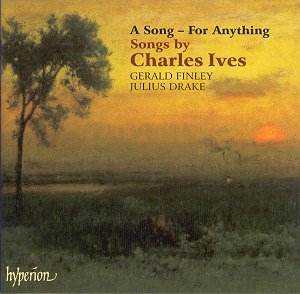Charles Ives’ song legacy presents a
unique challenge to its interpreters.
His songs derive from an enormously
wide variety of musical traditions,
from the German lied tradition - and
European art song in general - to American
parlor songs, hymns and folk tunes.
In addition, Ives’ own relentless experimentation,
which often bore little resemblance
to anything that preceded him,
led to a body of works that still presents
formidable challenges to any performer,
regardless of their background. In short,
how many singers are capable of singing
like Dietrich Fischer-Dieskau one moment
and an authentic Texas cowboy the next?
Aside from stylistic
variety, the songs also call for an
enormous range of emotional responses:
from mystical speculations about God
and Nature to a small child’s meandering
talk about his father, from abstruse
philosophical contemplations to sentimental
recollections of days gone by, from
the profoundly serious to the rowdiest
high jinks. All of these present yet
further challenges to any artist who
chooses to perform them.
Gerald Finley possesses
a manly yet vulnerable baritone voice
that’s quite remarkable. Pianist Julius
Drake is a much-lauded accompanist.
They have recorded an impressive recital.
Some of the most effective
songs are the foreign language pieces.
For the most part, these are more traditional
than Ives’ other works; most were composed
during his early years. Even so, these
songs are so wonderfully performed that
I found myself acquiring a new appreciation
for their vitality. The first song in
the recital, "Feldeinsamkeit",
sets the tone for much of the set. It
is deliciously inward and hefty, very
much in the German lied tradition. There
is a prevailing sense of loss and melancholy,
and the same could be said of all of
the German language pieces. They may
not be Ives’ most original works, but
I have never heard them performed so
convincingly. The same could also be
said of "Élégie",
a French language work. It’s shockingly
beautiful - a great performance. This
is a work to pull out when anyone claims
that Ives was incapable of writing beautiful,
traditional music. This is intoxicating,
and I can’t imagine anyone doing it
better.
The more traditional
English language songs are also perfectly
realized. In songs like "Berceuse"
and "Remembrance" Finley’s
velvety baritone and Drake’s limpid
pianism lead to very memorable performances.
The duo interprets many songs using
a more meditative approach than I have
heard before, and the results are usually
compelling. For instance, you might
compare Finley and Drake’s performance
of "The Things Our Fathers Loved"
with that by Thomas Stewart and Alan
Mandel (Columbia Records, M-30229, out
of print LP). Stewart is more sentimental,
less heavy, whereas Finley’s performance
is characterized by a greater sense
of loss. It’s more elegiac. Both performances
are convincing, even if they are different.
I find the less traditional
songs from Ives’ mature period to be
more of a mixed bag. Some of them are
wholly successful. For example, Finley’s
performance of "The Housatonic
at Stockbridge" is outstanding,
even if doesn’t culminate in the same
degree of ecstatic abandon as some others.
"Tom Sails Away" is also excellent.
Finley does a superb job of portraying
the protagonist’s recollected memories,
almost as if he is whispering them to
himself. Their performance of "West
London" is also very fine. I should
make special mention of Finley’s singing
in this difficult song; the lead-in
is breath-taking.
There several problems
with the less successful songs. In their
case Julius Drake’s piano suffers rhythmic
and dynamic weakness. For example, in
"General Booth Enters into Heaven,"
the pianist’s playing has a measured
quality where there should be ecstatic
abandon. Finley’s singing is excellent
- despite a bit of over-enunciating
- but the work is undermined by Drake’s
restraint. Also, sometimes the works
just don’t sound "American"
enough. This might be a matter of accents
(as in "Charlie Rutlage,"
where Finley’s southern accent isn’t
convincing) or a matter of holding back
where other interpreters belt it out.
I don’t want to imply
that any of these songs are poorly done.
Finley has an incredible voice, and
the overall impact of the disc is impressive.
Even more importantly, this disc offers
some of the most convincing renditions
of Ives’ earlier, more traditional songs
that I’ve ever heard. I enthusiastically
recommend it to all who are interested
in Charles Ives or art song in general.
Scott Mortensen
Scott Mortensen’s Charles Ives
web site


